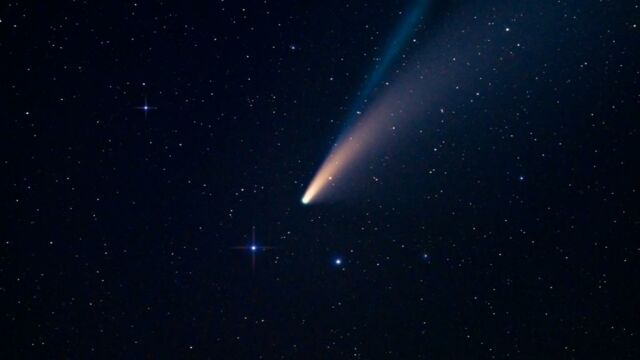You don't have to be a top NASA engineer to be in awe of the wonders of the Universe. Admittedly, it helps that spacecraft and orbiting telescopes give NASA a sneak preview of exoplanets, nebulae and Martian rovers... But sometimes, all you have to do is look up at the sky to observe celestial objects. Soon, a huge comet will be visible to the naked eye.
Discover our latest podcast
12P/Pons-Brooks, a comet of imposing size
This comet is 12P/Pons-Brooks. Discovered in 1812 by French astronomer Jean-Louis Pons, it is 30 kilometers in size! There's no doubt that a celestial object of this size could cause major damage if it were to collide with the Earth, but don't panic: 12P/Pons-Brooks is not expected to cross our planet, according to astronomers' predictions.
However, it should pass close to us in a few months' time. It should be close enough for us to be able to see it without even using a telescope or binoculars. According to Starwalk:
Pons-Brooks is a cold volcano traveling through space. It is an active cryovolcanic comet with a solid core capable of undergoing violent explosions and releasing what scientists call 'cryomagma', composed of substances such as water, ammonia or methane.
You can see the comet in 2024
This celestial object takes around 70 years to orbit the Sun. It was first observed with the naked eye in 1954, and will offer us a new spectacle on April 21, 2024. On that date, it will reach perihelion, its closest point to the Sun.
The comet's distinctive horn-shaped tail has led to comparisons with Han Solo's trusty Millennium Falcon in the Star Wars saga. We'll let you judge for yourself.

This article was translated from Gentside France.
Read more:
⋙ Mega-asteroid twice the size of the Eiffel Tower will graze the Earth this week
⋙ An asteroid the size of a killer whale to graze Earth
⋙ What would dinosaurs look like if they were on Earth today?
Sources:
Live Science: City-size comet racing toward Earth regrows 'horns' after massive volcanic eruption
Starwalk: 12P/Pons–Brooks : Comète de 2024 à Voir Sans Optique















